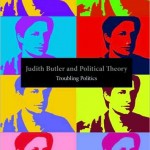I was very excited to see the subtitle of this book by Samuel A. Chambers and Terrell Carver: Judith Butler and Political Theory: Troubling Politics. Like me, Chambers and Carver are interested in giving serious attention to Butler’s idea and practices of troublemaking. Excellent. As political theorists, their focus is on the politics of troubling. Connected but different, my approach is on the ethics of troublemaking and troublestaying.
Check out their description of the goal of the book:
Our goal in this book is to explore the types of trouble that Butler has got herself and her readers into, to investigate the manner in which she has made trouble and to track the effects that her troubling has had on politics and the political. In so doing we seek to bring Butler into clearer view as a political thinker–to bring to light her political theory as a politics of troubling and troubling of politics (2).
I find their discussion of troubling, especially in the introduction, to be very helpful in clarifying how troubling functions within Butler’s work. In that introduction, they offer three different ways in which to understand troubling politics
 First, the troubling in troubling politics is an adjective. The vision of politics that comes out of Butler’s work is troubling (as in worrisome, disturbing, unsettling, problematic) to many theorists/activists. These critics describe Butler’s politics as troubling to indicate that there is something not quite right about her project, especially her understanding of the political subject. Sure, she might develop a vision of politics and political action, but that vision produces a politics that is troubled/troubling and that, according to some, doesn’t ultimately work. And because it is troubling to others/doesn’t really work, Butler’s vision of politics gets her in trouble.
First, the troubling in troubling politics is an adjective. The vision of politics that comes out of Butler’s work is troubling (as in worrisome, disturbing, unsettling, problematic) to many theorists/activists. These critics describe Butler’s politics as troubling to indicate that there is something not quite right about her project, especially her understanding of the political subject. Sure, she might develop a vision of politics and political action, but that vision produces a politics that is troubled/troubling and that, according to some, doesn’t ultimately work. And because it is troubling to others/doesn’t really work, Butler’s vision of politics gets her in trouble.
Second, the troubling in troubling politics is a verb. Through her interrogation of feminist politics and her challenge to gender, Butler is destabilizing feminist politics as usual with the aim of transforming it. In this sense, Butler is engaged in the act of troubling politics and the term troubling describes that act.
Third, the troubling in troubling politics is a noun. Throughout Gender Trouble and beyond, Butler has developed a political vision that is predicated on (it is its groundless ground perhaps?) troubling everything: subjects, identity categories, politics, ethics, democracy, The Brady Bunch (oh wait, that’s me, not Butler). Troubling is not a description used to modify and undercut politics (adjective). Nor is it something that one does to politics (verb). Instead, it is “its own politics” (9).
Exactly. Could there be a correlation between these three types of troubling and my versions of trouble on this blog (that is, making/being in/staying in trouble)?
- Does trouble as an adjective describe the state of being in trouble?
- Does trouble as a verb describe the act of making trouble?
- Does trouble as a noun describe the ethics of staying in trouble?
Wow. I need to think about this some more. How do these three understandings of trouble work together/against each other to form a more systematic politics and ethics of troublemaking? Are there other ways to describe trouble? How is my vision of troublemaking connected/disconnected from Chambers’/Carver’s vision here? Is it helpful to think about trouble in this way or do I just like it because of my fixation on things-in-threes (I am my father’s daughter) and things-that-fit-in-neat-packages? Ah well, three is a magic number…
